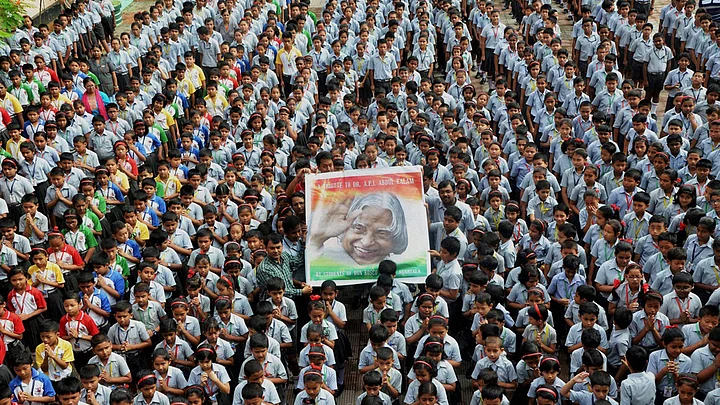I got to know Dr Abdul Kalam personally in the mid-60s when he was picked by Vikram Sarabhai for a national space programme still in its infancy. I had known of him by reputation somewhat earlier, when he was working on the design and development of the country’s first hovercraft at the Aeronautical Development Establishment.
I got to know him more closely as the space programme grew, and discovered that he was the most unusual technologist I had ever met in India or elsewhere. Here was somebody who had a passion for rockets and missiles and aerospace technology, but lurking beneath that exterior was a heart beating for a hugely broader and more ambitious vision – a vision that included agriculture, health, education, bio-technology, IT and so on.
His objective was to make India a developed nation by 2020, and I was privileged to have been a member of the group which helped him prepare that vision. In the first 15 years of our acquaintance our relations were largely occupied with science and technology issues connected with aerospace development. The high-speed aerodynamics laboratory at IISc, Bangalore, had some of the first facilities in the country where new regimes of gas flow – high temperature, high speed, low density etc – could be studied in detail.
Harnessed Power of Computers
Besides, the growing power of computers was beginning to make it possible for handling many of these flows numerically. The collaboration between my colleagues, students and myself at the IISc and later at National Aerospace Laboratories (which at that time had the country’s most powerful computer using parallel computation technologies) had led to an enhancement in national capabilities of the kind required of programmes that Kalam was working on.
But during these early years it was already clear what an unusual person Kalam was. In his habits and lifestyle he was simple, almost ascetic. He did not seem to want to chase wealth or power, but was clearly driven by an extraordinary passion for designing and building ambitious technological systems. These characteristics, along with his great personal charm and obvious commitment to the project on hand (“the project is more important than you or me” were common words on his lips) made it very difficult for anyone to say no when Kalam sought help.
The late Professor Ramaseshan would say that Kalam could milk a tigress. The Kalam charm included a very positive view of Indian capabilities accompanied by a winning smile – as if he was constantly amazed at the lovely technology that could result from such joint effort. Even though he knew only two languages, Tamil and English, his ability to communicate was unbelievable – from the illiterate to the scholarly, from the poor to the ultra rich, from the weakest to the most powerful, from the peasant to the president, from kids to senior citizens – his ability to communicate was phenomenal.
Epitome of Simplicity
This was due to a confidence born of achievement, a simplicity that did not seek returns (as Gita instructed) and a generally sunny outlook on the extraordinary potential of his country. He was one of the very few leaders who were seen as beyond caste, religion, language, social and economic status and so on. After the success of the second SLV-3 launch, Kalam (who was project director of SLV-3) came to ISRO headquarters in Bangalore as an advisor on launch vehicle projects, and was also associated with the Space Technology Cell set up by ISRO at IISc (I was then its chairman).
The association with IISc made him consider two projects: (i) preparing a detailed account of the SLV-3 project, and (ii) working towards a PhD degree. He asked me whether he could do the PhD with me, and I told him, with all sincerity, that with his record he did not need a PhD. In any case, soon thereafter Kalam left the space to become Director of the Defence Research and Development Laboratories at Hyderabad. He proceeded to transform the nascent rocket programme that was started some years earlier at DRDL into a set of projects with specific goals and special funding arrangements, and they started delivering successful systems before long.
His World of Projects
For Kalam any words that were not useful in setting up one or more well-defined projects reflected woolly thinking. ‘Projects’, so to speak, were his third language (after Tamil and English). Even development, for example, became a serious issue for him only when it had identified a set of projects – with clear goals, specific time lines, well defined budgets, a strict system of reviews and so on. I strongly believe this attitude continued in his India vision programme as well. But in spite of this apparently technology-centric view on how the country could progress, his goals and attitudes were very societal and human; that was what made him such a unique personality.
His encounters with the arts were also interesting. He had learned to play the veena. On one occasion when asked what his favourite music was, he replied immediately ‘Endaro mahanubhavulu’ (collection of Carnatic songs) to the utter amazement and loud applause of his audience.
So what made Kalam unique was that he defied monocultural paradigms: he was a technologist with a big heart, a man who broke up the development of the nation to a large series of doable projects, an ascetic in his personal life, and a person who respected ability wherever he found it, with total disregard for wealth, power, degrees, position, class. (He reminded me of the Veerashaiva Kannada maxim Kayakave Kailasa, work is heaven).
He was a task-master who got his work done with a smile rather than a rebuke. No wonder he was the most popular president and an object of admiration, affection and respect, irrespective of religion, caste and age.
(The writer is Year-of-Science Professor, Engineering Mechanics Unit, Jawaharlal Nehru Centre for Advanced Scientific Research, Bangalore)
